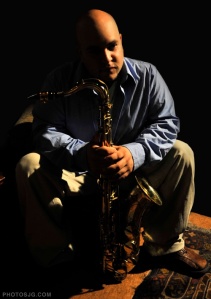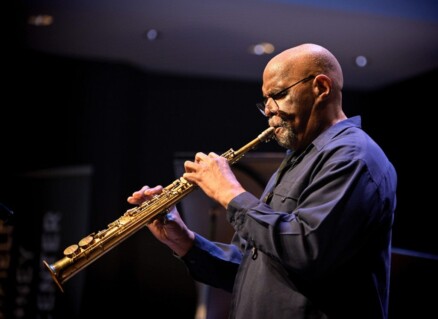Interview | Albert Rivera finds his ‘Inner Peace’


Turnaround Records saxophonist Albert Rivera and his organ band will grace the District tonight with a performance at Twins Jazz. Rivera’s got a strong but loose-fitting sound on the tenor and soprano saxophones, one that’s easily malleable and reactive to the players he works with. His improvising bears obvious resemblances to John Coltrane, but it’s all set off by arrangements and grooves that nod to modern-day neo-soul.
Rivera’s band tonight consists of Beck Burger on organ, Andrew Lipow on guitar and U Street All-Star Nate Jolley on drums. Most of Rivera’s recently released album, Inner Peace, features an acoustic band, but on a few tracks he plays with an organ quartet – albeit one featuring different musicians than tonight’s will. But no matter the music’s instrumentation, timbre or vibe, Rivera usually finds his own inner peace by playing with musicians he can also call his close friends. This connection between the musicians is bound to create a sound that you won’t want to miss at Twins.
Albert took some time over the weekend for an e-mail interview with CapitalBop in anticipation of his gig.
CapitalBop: You often use an organ quartet. What is it about the organ group that attracts you?
Albert Rivera: The organ band is a whole different feel than my acoustic band. I always wanted a group that can be true to the jazz form, but at the same time have grooves so heavy that it would make people want to dance and move. Ever since hearing some of my first recordings of Jimmy Smith playing organ, to modern-day groups like saxophonist Don Braden’s organ group and Joshua Redman’s band, it really gave me a great perspective on what the possibility is of performing and writing music for a band of this setup. Everywhere we go people love the music, so I’m confident that this group will be together for a while. We have a lot of new concepts we wanna try out, and a whole lot of music still to be written. Stay tuned!
CB: Listening to Inner Peace, I feel strong soulful and spiritual elements in not only your playing, but in the overall sound of the album. Similar to some of John Coltrane’s music. What and/or who influenced you in making this album?
AR: You’re right, John Coltrane is probably my biggest influence, and though I was not trying to simply repeat overall ideas that Coltrane mastered while creating some of the best albums in music history, I wanted to create an album that had different emotions with each song – from fun to serious and thoughtful. As I stated before, I love Joshua Redman’s musical concepts as well, so the last 10 years was filled with checking him out, hence the organ band being formed. I do admit, my biggest influence in writing music and this album is not an actual musician, but life itself. Stories I hear, articles I read, experiences in day-to-day existence.
CB: This week at Twins you have your organ group playing with you; could you tell us a little about the musicians on the gig?
AR: I’ve always heard different styles in my mind when it comes to the creation of music. The band coming down to D.C. with me this week is my organ band. On the record it consisted of Beck Burger on organ, Mark Whitfield on guitar and drummer John Iannuzzi. As far as the horns were concerned, Jean Caze joined me on trumpet. For this show I’m fortunate in having Beck Burger join me once again, and for drums Nate Jolley [who did 7 of the 10 tracks on Inner Peace], and finishing off the quartet is New York native Andrew Lipow on guitar. The beauty of it all is that the four of us have been friends for a long time as well, and though the band is only a little over a year-and-a-half, we have really gotten a tight feeling with performing together.
CB: The drummer on your gig, Nathan Jolley, is one of D.C.’s rising stars. In addition, you guys both hold down the gig at B. Smith’s in your respective cities. Those who know Nate know that he’s one of the most positive guys around and always has a smile on his face. How did you two connect and what drew you to his playing?
AR: Nate and I met years ago at a jazz conference in New York City. I remember our first hang clear as day. We both attended a jam session that was being held at the conference; it was a number of us hanging out, including trumpeter Nick Roseboro, and at the end of the session we all started talking. The vibe was such a great vibe, we continued the hang into the early morning, stopping in a local diner to eat. We talked about it all – life, music and everything in between. Years passed, and every time there was a notable event in New York, Nate and his brother would always be around. We always stayed in touch and as I started to work as a bandleader more and more after college, more opportunities came up to hire Nate – so I did.
Back in the end of August 2009, I was hired to start doing weekly shows in B. Smith’s New York. Things were going so well that we started a jazz brunch series on Sundays. As that continued the momentum even more, the idea to bring music back to B. Smith’s D.C. was the next step. Since I live in N.Y., I knew it would be hard to manage the music down there. So when I thought of who would be the best person to help put this together, Nate Jolley was the first person that came to mind. It made perfect sense. So here we are, a strong music series in both B. Smith’s, in New York and D.C.
Many people who know me personally know that I am always the person that sees the positiveness in everything. It was the funniest thing as I got to know Nate throughout the year how similar we are in how we view things, act and are as bandleaders. They say the world attracts the same. In this case, it proved correct.
CB: I was reading your blog and it looks like you had quite the time in Hartford, selling out a show at Szechuan Tokyo and doing an interview on WWUH. What is your connection to Connecticut?
AR: When I was 15, I started to attend the Litchfield Jazz Camp during the summer. That proved to be one of the biggest turning points in my entire musical life. It gave me a clear direction of what I needed to do to become a successful musician, as well as how to practice, and how to present myself to others – not only as a musician, but as a person. It helped me get into college and the people I met have had a direct influence on me as a musician, as well as on my career. The Litchfield Jazz Camp is where I met both Luques and Zaccai Curtis, and Mark Whitfield [all of whom are on Inner Peace]. On my previous album, saxophonist Jimmy Greene was a guest and he too I met at the summer school. I’ve performed with Winard Harper for some time, as well as performances with Claudio Roditi, [with] both of whom my relationship started at the Litchfield Jazz Camp. The experiences go on and on, and now being the assistant musical director of the school, Connecticut is as important to me as ever. The staff at Litchfield Performing Arts are people, who I consider to be my family. I owe them a lot [in] my career. The way I see it, without the people from Connecticut, my band and sound would be a completely different one, since the core of my group [the Curtis Brothers] are Connecticut natives.
CB: Zaccai and Luques Curtis have been a strong force in this generation’s cast of young lions. Tell me a little bit about them and how they contribute to portraying your music on the album.
AR: The Curtis Brothers have been performing with me for many years. We met years ago at a jazz summer camp and we hit it off well. They are solid musicians and beyond being such amazing people, they are in the top of their form as musicians. I always know what I am going to get with them: pure intensity with the music while catching all the small things that make everything ever so sweet. My music is very open-ended; both the melody and changes are very loose, allowing the music to go wherever it leads to. It’s always been that way, so having someone like Zaccai on piano to adapt makes it so fun to play, and always expecting the unexpected. I guess in the end, it doesn’t hurt that we are such close friends and have been playing together for such a long time.
CB: Well, Albert, we’re definitely looking forward to your appearance in D.C. this week. Have you performed here much prior to your upcoming concert? If so, what do you like about performing in the nation’s capital?
AR: I’ve been fortunate to play in D.C. often. When I was performing with Winard Harper I found myself in D.C. a few times, and I’ve come down to perform with Nate [Jolley] in various clubs, and of course playing at B. Smith’s with Nate. I love playing in D.C. There is such an appreciation for jazz music, and that is what makes things so amazing. Having a crowd that thrives for the intensity, for great music. To see their feet tapping, heads moving and bodies shaking makes it even better. The history of jazz music in D.C. is important – I mean, the way I see it, D.C. gave birth to Duke Eillington, Dr. Billy Taylor, Shirley Horn and many more. It is our duty to keep the music going for generations to come.
—
The Albert Rivera Quartet plays at Twins Jazz tonight at 8 p.m. Find pricing, times and other details about the show here. Read about Twins Jazz here. Buy tickets at TwinsJazz.com.
albert rivera, DC, interview, jazz, Nate Jolley, Twins Jazz, U Street, Washington




